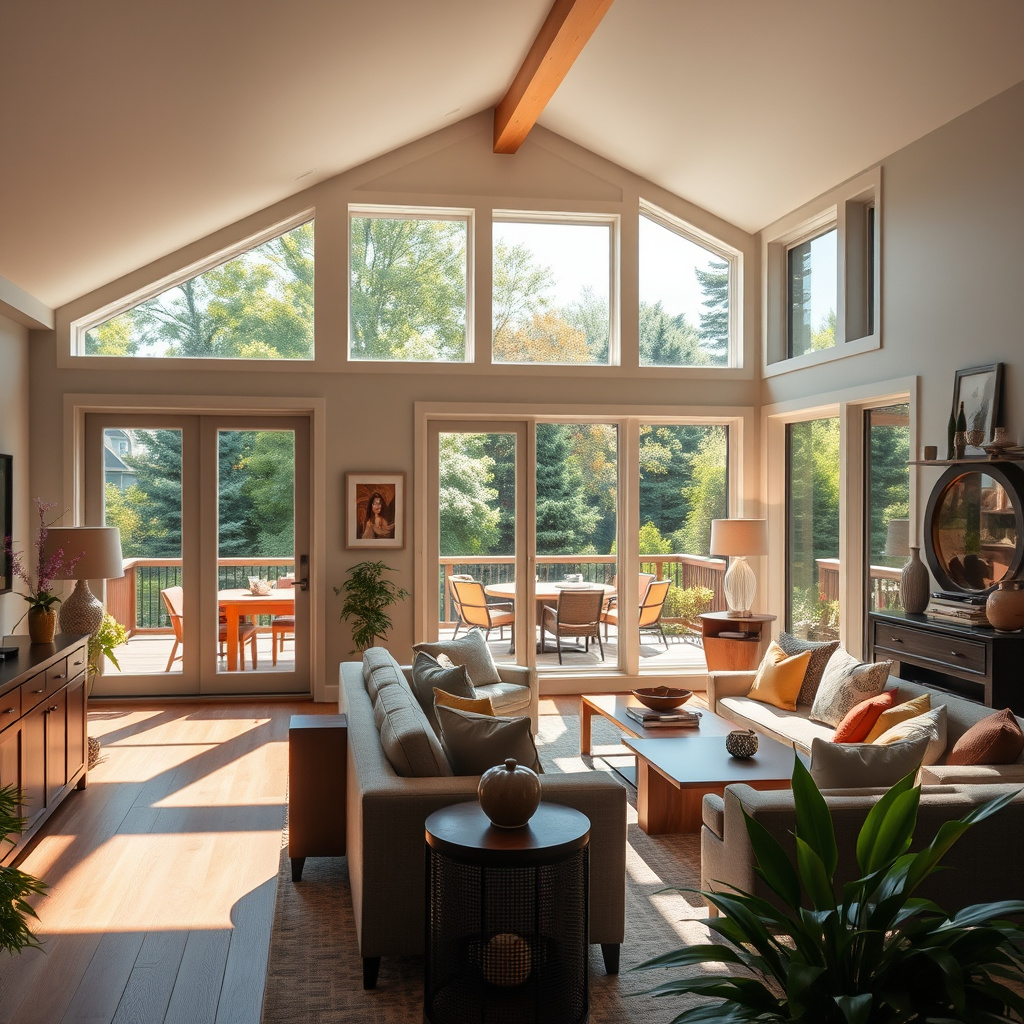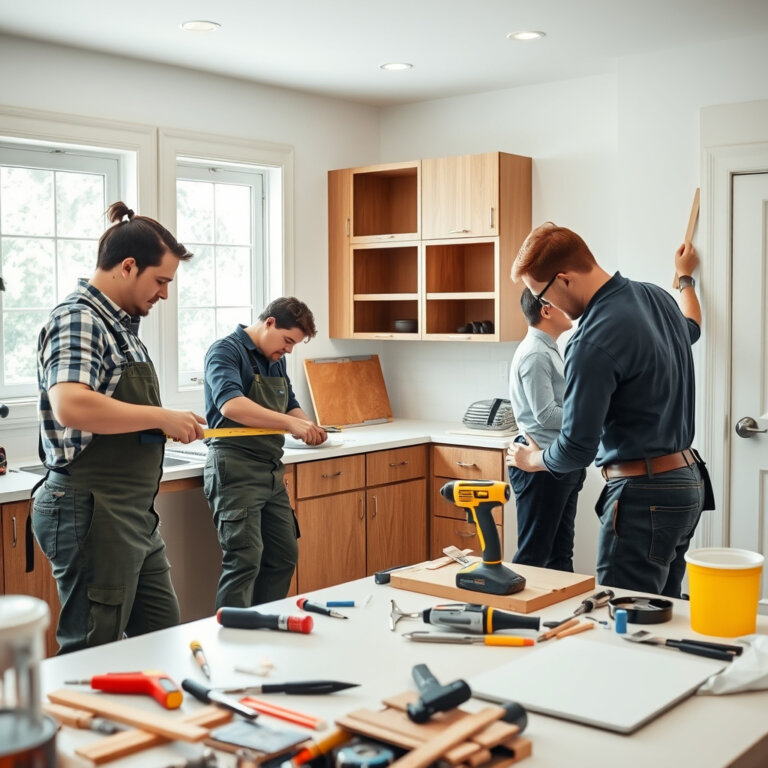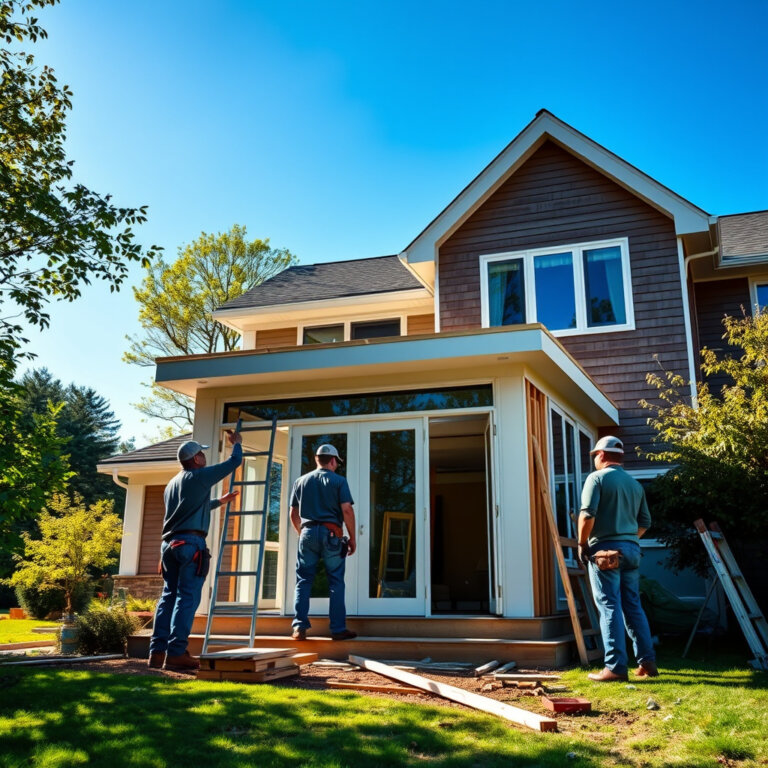Home addition quotes Massachusetts refer to the cost estimates provided by contractors for expanding or adding new spaces to residential properties in Massachusetts.
Are you considering a home addition? Home addition quotes Massachusetts can provide you with a clear picture of the costs involved in your project.
In this post, we will explore how to obtain accurate quotes, what factors influence pricing, and the necessary permits you’ll need.
By the end, you’ll be equipped with the knowledge to confidently approach contractors and make informed decisions that enhance your home’s value and functionality.
Understanding the Basics of Home Additions
When considering a home addition, it’s essential to grasp the fundamental aspects that will shape your project. Home additions can significantly enhance your living space, increase your property’s value, and improve your overall quality of life. However, before diving in, you should understand a few critical elements that can lead to a successful outcome.
Types of Home Additions
There are various types of home additions, each serving different needs and preferences. Here are some common options:
- Room Additions: This is the most straightforward type, involving the addition of a new room, such as a bedroom or a family room.
- Second-Story Additions: If you want to maximize space without expanding your home’s footprint, consider building upward.
- Sunrooms: These are great for bringing in natural light and can serve as a relaxing space.
- Garage Additions: Adding a garage can provide extra storage and protect your vehicles from the elements.
Choosing the right type of addition depends on your specific needs, budget, and the existing structure of your home.
Planning and Permits
Before you start your home addition project, planning is crucial. This involves creating a design that fits your vision and adheres to local building codes. In Massachusetts, obtaining a home addition permit Boston MA is often necessary. This ensures that your addition is safe and compliant with local regulations. It’s advisable to consult with a licensed contractor Massachusetts who is familiar with the permitting process to avoid any hiccups.
Budgeting for Your Addition
Understanding the average cost of home addition MA can help you budget effectively. Costs can vary widely based on factors like size, materials, and the complexity of the project. It’s wise to outline a detailed cost breakdown, including labor, materials, and any unexpected expenses that may arise.
Consider that if you’re also thinking about a kitchen remodel, knowing the cost of kitchen remodel in Worcester MA can influence your overall financial planning.
Finding Reliable Contractors
Finding the right professionals to bring your vision to life is essential. Look for general contractors Massachusetts who have a proven track record with home additions. Reading reviews and asking for recommendations can help you find home renovation contractors near me that are trustworthy and capable. Make sure to verify their licenses and insurance to ensure you’re working with qualified individuals.
Understanding the Construction Process
Once you have your plans, permits, and contractors lined up, the construction process can begin. Keep in mind that this phase can be disruptive, so it’s important to communicate with your contractor about timelines and what to expect. Regular check-ins can help address any concerns that may arise during the project.
In the end, a successful home addition is a combination of careful planning, budgeting, and collaboration with licensed roofing contractors Newton MA and other professionals. Whether your goal is to expand your living space or enhance your home’s value, understanding the basics can empower you to create the perfect addition to your home.
Key Factors Influencing Home Addition Costs
When considering a home addition, it’s essential to understand the various factors that can influence the overall costs. These elements can significantly impact your budget and the final outcome of your project. Here’s a closer look at what to keep in mind.
1. Size and Scope of the Addition
The most apparent factor affecting costs is the size of the addition. A larger space requires more materials and labor, driving up expenses. Similarly, the complexity of the project—such as adding multiple rooms or integrating features like large windows or custom designs—will also influence the final price.
2. Materials and Finishes
The choice of materials can greatly affect your budget. High-quality materials, such as premium flooring or energy-efficient windows, may cost more upfront but can save money in the long run through reduced maintenance and energy bills. It’s important to weigh the benefits of different materials against your budget constraints.
3. Labor Costs
Labor is a significant part of any home addition project. The rates can vary based on the experience and reputation of the workers involved. Hiring a licensed contractor Massachusetts or a general contractor Massachusetts can ensure quality workmanship but may come with higher fees. It’s advisable to get multiple quotes to compare labor costs and find the best fit for your project.
4. Permits and Regulations
Navigating the permitting process is crucial for any home addition. In cities like Boston, understanding the building permit requirements Boston MA is essential to avoid delays and additional costs. Permits can range in price and are necessary for ensuring that your addition meets local building codes. Familiarize yourself with the home addition permit Boston MA to streamline this process.
5. Location and Site Conditions
The geographical location of your home can also impact costs. If your property is in a more expensive area or if it has challenging site conditions, such as difficult terrain or existing structures that need to be removed, expect to pay more.
6. Design Complexity
The complexity of the design will also play a role in determining costs. Unique architectural features or intricate layouts can require more skilled labor and time, leading to higher expenses. Engaging with home renovation contractors near me can provide insights into practical design solutions that fit your budget.
7. Existing Infrastructure
The condition of your existing home infrastructure can affect the overall cost of the addition. If your home requires upgrades to plumbing, electrical systems, or roofing to accommodate the new space, these additional expenses can add up quickly. Consulting with a licensed roofing contractor Newton MA can ensure that your roof can support the new addition.
8. Seasonal Factors
Timing can also influence costs. Depending on the season, labor and material prices may fluctuate. Starting a project during the off-peak season can sometimes lead to lower costs.
In summary, understanding these key factors will help you navigate the home addition process more effectively. By considering the size and scope, materials, labor costs, permitting, location, design complexity, existing infrastructure, and seasonal factors, you can better prepare for the average cost of home addition MA and make informed decisions. Always strive to find reliable contractors and ensure your project aligns with your vision and budget.
Navigating the Permitting Process for Home Additions
When you decide to expand your living space through a home addition, understanding the permitting process is crucial. This journey can feel overwhelming, but with the right knowledge and preparation, you can navigate it smoothly. The first step is to familiarize yourself with the home addition permit Boston MA requirements, as each municipality may have specific regulations that you need to adhere to.
Understanding Permit Types
Generally, there are different types of permits you may need when planning a home addition. These can include:
- Building Permits: Required for any structural changes.
- Electrical Permits: Needed if your project involves new wiring.
- Plumbing Permits: Necessary for any plumbing modifications.
Knowing which permits to apply for can save you time and prevent costly mistakes. Consulting with a licensed contractor Massachusetts can be invaluable here, as they often have experience navigating these waters and can guide you through the necessary steps.
Gathering Your Documentation
Before you apply, ensure you have all required documentation ready. This typically includes:
- Your property deed
- Site plans or architectural drawings
- Proof of property taxes
Having these documents on hand will streamline the process, making it easier for local authorities to review your application. If you’re unsure what specific documents are needed, a good starting point is your local building department’s website.
Applying for Your Permit
Once you have all your documents ready, it’s time to apply for the necessary permits. Most municipalities allow you to submit your application online, which can be a convenient option. If you are wondering how to apply for building permit, you can usually find detailed instructions on your local government’s website. Make sure to double-check that you have filled out all forms correctly to avoid delays.
Understanding the Timeline
The review process for permits can vary widely depending on your location and the complexity of your project. Generally, it can take anywhere from a few weeks to several months. During this time, your application may be reviewed by various departments, including zoning and planning. Being patient and prepared for additional requests for information can help ease the process.
Engaging Contractors
After obtaining your permits, you will likely want to hire professionals to carry out the work. To ensure quality and compliance, look for general contractor Massachusetts or home renovation contractors near me with solid reputations. They will help manage the project while adhering to all local codes and regulations.
As you progress, don’t hesitate to ask your contractor about the cost of kitchen remodel in Worcester MA or any other specific details related to your home addition. A clear understanding of costs can help you plan your budget more effectively.
Final Inspection
Once your home addition is completed, a final inspection will typically be required. This ensures that all work meets local building codes and that the project was completed as per the approved plans. Failing this inspection could lead to further delays or even fines, so it’s essential to ensure everything is done correctly before this final step.
By understanding and carefully navigating the permitting process, you can make your home addition project a success. Take the time to do your research, gather the necessary documentation, and work with experienced professionals to ensure a smooth journey from start to finish.
How to Prepare for Home Addition Quotes
When you’re considering expanding your living space, knowing how to prepare for home addition quotes is crucial. This process can feel overwhelming, but with the right approach, you can simplify it and ensure you’re well-informed.
Gather Your Ideas and Needs
Start by envisioning what you want from your home addition. Are you looking for a larger kitchen, an extra bedroom, or perhaps a sunroom? Make a list of your needs and wants. This will not only help you communicate effectively with potential contractors but also guide you in understanding the scope of your project. Consider factors like how the addition will enhance your daily life and what features are essential for your family.
Research Local Contractors
Finding reliable contractors in Massachusetts is a significant step. Look for licensed contractors Massachusetts who have experience with home additions. You might want to check online reviews, ask for recommendations from friends or family, and consult local building supply stores for suggestions. Make a shortlist of potential candidates, focusing on those who specialize in the type of addition you have in mind.
Prepare Your Budget
Understanding the average cost of home addition MA can help you set a realistic budget. While it’s important to know your financial limits, also consider the potential return on investment. Talk to contractors about estimated costs and any factors that might influence pricing, such as materials and design complexity. This information will be vital when comparing quotes.
Documents and Permits
Before requesting quotes, familiarize yourself with the home addition permit Boston MA process. Certain projects may require permits, and understanding these requirements can save you time and potential headaches. Collect any necessary documentation, such as property surveys or architectural plans, which may be requested by contractors to provide an accurate quote.
Set Up a Meeting with Contractors
Once you have your list of potential contractors, schedule meetings to discuss your project. Be prepared to share your ideas and budget, and ask about their previous projects, timelines, and processes. This is also the time to inquire about their experience with obtaining permits for home improvement projects. A good contractor will be transparent and willing to guide you through the permitting process.
Request Detailed Quotes
When you receive quotes, ensure they are detailed and itemized. This should include labor costs, materials, and any additional fees. A comprehensive quote will help you understand where your money is going and allow for easier comparison among contractors. Don’t hesitate to ask questions if anything is unclear.
Check References and Past Work
Before making a final decision, check references and look at past work. This will provide insight into the contractor’s quality and reliability. If possible, visit some of their completed projects or find testimonials online. You want to feel confident that you’re choosing the best general contractor Massachusetts has to offer.
Finalize Your Decision
After evaluating the quotes and feedback, select a contractor who aligns with your vision and budget. Make sure to review the contract carefully before signing to ensure all details are covered, including timelines and payment schedules.
By following these steps, you’ll be well-prepared to request and evaluate home addition quotes, making the process smoother and more efficient as you embark on your exciting home renovation journey.
Comparing Quotes: What to Look For
When you’re ready to embark on a home addition project, comparing quotes is a crucial step in ensuring you get the best value for your investment. This process can feel overwhelming, especially with varying prices and services offered by different contractors. However, understanding what to look for can simplify your decision-making and lead to a successful project.
Understanding the Quote Breakdown
Start by examining the details of each quote. A comprehensive quote should include a detailed breakdown of costs. Look for:
- Labor costs: This should reflect the number of hours estimated for the project and the hourly rate of the workers.
- Materials: Ensure the quote specifies the types and quality of materials to be used. This is important as it affects both the budget and the longevity of your addition.
- Permits: If your project requires a home addition permit Boston MA, make sure this cost is included. Understanding the permitting process is essential, as it can affect your timeline and budget.
Assessing Contractor Credentials
Another critical aspect of comparing quotes is evaluating the contractors themselves. You want to ensure you’re working with qualified professionals. Look for:
- Licensing: Verify that the contractors are licensed and insured. A reputable licensed contractor Massachusetts will provide peace of mind and protection for your project.
- Experience: Consider the experience of each contractor in handling home additions. Checking their portfolio can give you insights into their work quality.
- Reviews and References: Look for testimonials or ask for references from previous clients. This can give you a sense of their reliability and customer satisfaction.
Evaluating Services Offered
Not all contractors offer the same services. When comparing quotes, pay attention to what each contractor includes:
- Scope of Work: Ensure the scope of work is clearly defined. Does the quote include everything from design and planning to the actual construction? Understanding this can help prevent unexpected costs later.
- Project Timeline: Ask about the estimated timeline for completion. A detailed schedule can help you plan your life around the construction.
- Warranties and Guarantees: Inquire about warranties on both labor and materials. A contractor who stands behind their work will often provide guarantees for a certain period.
Cost Comparisons and Hidden Fees
While the initial quote may seem attractive, be wary of hidden fees that may arise during the project. Make sure to discuss:
- Additional Costs: Ask about potential additional costs that could arise. This could include changes in scope, unexpected issues, or delays.
- Payment Schedule: Understand the payment terms. A reputable contractor will typically have a clear payment schedule that aligns with project milestones.
In the current market, it’s essential to not only focus on the lowest price but also consider the overall value. The average cost of home addition MA can vary significantly based on location and the complexity of your project. Taking the time to compare quotes thoroughly will help you find the right fit among the best general contractors in Boston, ensuring your home addition is both beautiful and functional.
By staying informed and diligent, you’ll be better prepared to navigate the complexities of home renovations. This attention to detail can lead to a smoother construction process and a final result that enhances your living space for years to come.
Finding Reliable Contractors for Your Home Addition
When you’re ready to expand your living space with a home addition, the first step is finding the right contractors to bring your vision to life. Finding reliable contractors in Massachusetts can feel overwhelming, but knowing what to look for can make the process smoother and more rewarding.
Start with Research
Begin your journey by conducting thorough research. Ask friends and family for recommendations, and utilize online resources to compile a list of potential candidates. Look for licensed contractors Massachusetts who have experience with home additions. Check their portfolios for previous work that aligns with your style and needs. Websites that specialize in contractor reviews can also provide insights into their reputations.
Check Credentials and References
Once you have a shortlist, delve deeper. Verify that each contractor holds the necessary licenses and insurance. This is crucial for protecting yourself and ensuring that the work meets local building regulations. Don’t hesitate to ask for references from past clients. Speaking to previous customers can offer a clearer picture of the contractor’s reliability, communication style, and quality of work.
Meet in Person
Arrange meetings with your top choices. This is an essential step in the process. During these meetings, discuss your home addition project in detail. Observe how the contractor listens and responds to your ideas. A good contractor will not only provide valuable input but also ensure that you feel heard and understood. This is vital for establishing a collaborative working relationship.
Request Detailed Quotes
After discussing your plans, ask for detailed quotes. A reputable contractor will provide a cost breakdown for kitchen renovations or other aspects of your project that outlines labor, materials, and any additional costs. Compare these quotes carefully, looking for transparency in pricing. If something seems too low, it might be a red flag. Remember, quality work often comes at a fair price.
Understand the Timeline and Process
Before making a decision, clarify the expected timeline for your home addition. Reliable contractors should be able to provide an estimated schedule for project milestones. This will help you plan accordingly and ensure that your project stays on track. Discuss any required home addition permits Boston MA and how the contractor will handle those applications. A contractor familiar with local regulations will streamline this process and help you avoid unnecessary delays.
Trust Your Instincts
Ultimately, trust your instincts when making your decision. A contractor should not only possess the right skills and experience but also make you feel comfortable and confident in their abilities. The relationship you build with your contractor is essential for a successful project. Look for someone who shares your vision and can communicate openly throughout the process.
Finding the right professionals for your home addition doesn’t have to be daunting. With careful research, clear communication, and a focus on building a trusting relationship, you can ensure your project is in good hands. By taking these steps, you’re setting the foundation for a successful home renovation that meets your needs and enhances your living space.
Maximizing Value in Your Home Addition Project
When considering a home addition, the goal is often to enhance both your living space and the overall value of your property. Understanding how to maximize this value involves several strategic steps that align with your vision while keeping your budget in check.
Strategic Planning: The First Step
Start by defining the purpose of your addition. Are you looking to create a new bedroom, expand your kitchen, or add a sunroom? Each choice has different implications for cost and functionality. It’s essential to prioritize your needs and consider how they align with current market trends. For example, expanding your kitchen may not only provide immediate satisfaction but also appeal to future buyers, significantly impacting the average cost of home addition MA.
Quality Over Quantity
Investing in quality materials and skilled labor can make a substantial difference in the longevity and aesthetic of your addition. While it may be tempting to cut costs, remember that low-quality work can lead to more significant expenses down the line. Hiring a licensed contractor Massachusetts ensures that the work is done correctly and meets all local building codes, which is vital for maintaining your home’s value.
Smart Budgeting and Cost Management
Craft a detailed budget that outlines all potential costs, including materials, labor, and even permits such as the home addition permit Boston MA. Understanding the cost breakdown for kitchen renovations can help you allocate resources effectively. Additionally, consider the cost of kitchen remodel in Worcester MA to gauge how your project fits into regional pricing trends.
Choosing the Right Contractors
Finding reliable contractors is crucial for a successful home addition. Start by researching home renovation contractors near me and looking for general contractor Massachusetts with solid reviews. Schedule interviews and ask for previous work samples. A trustworthy contractor will be transparent about costs and timelines, which helps you avoid unexpected expenses.
Focus on Curb Appeal
Enhancing the exterior of your home can significantly increase its value. Make sure your addition complements the existing architecture and landscaping. Small touches like siding, paint, and landscaping can create a cohesive look that appeals to both your family and future buyers.
Permitting Process and Compliance
Navigating the permitting process can be daunting but is essential. Ensure that you have all the necessary building permit requirements Boston MA in place before beginning your project. This will not only keep your project on track but also protect the investment you’re making.
Final Touches: Interior Design Choices
Once the structural work is completed, focus on the interior design. Choose colors, fixtures, and finishes that enhance the space and align with contemporary trends. Thoughtful design choices can elevate your home’s appeal and value significantly. Consider consulting with a designer who understands current market preferences.
By taking these steps, you can ensure that your home addition project is both a personal sanctuary and a sound financial investment. The effort you put into planning and executing your vision can lead to a space that not only meets your needs but also becomes a valuable asset in the long run.
Trends in Home Additions
In the present landscape of home improvements, homeowners are increasingly leaning toward innovative and functional home additions. These enhancements not only elevate the living experience but also add significant value to properties. The desire for more space is a common thread, with many individuals looking to accommodate growing families, create home offices, or simply enhance their living areas.
Emphasis on Multi-Functional Spaces
One of the most notable trends is the focus on multi-functional spaces. Homeowners are seeking additions that serve several purposes. For instance, a sunroom can double as a workspace and a relaxation area. This trend reflects a shift towards creating environments that cater to diverse needs. In addition, incorporating smart technology into these spaces is becoming increasingly popular, allowing for more efficient use of energy and enhancing overall convenience.
Sustainable Building Practices
Another key trend is the emphasis on sustainability. Homeowners are more conscious of their environmental impact and are opting for eco-friendly materials and energy-efficient designs. This may include utilizing sustainable timber, energy-efficient windows, and solar panels. Working with a licensed contractor Massachusetts who understands these trends can ensure that your home addition is not only stylish but also environmentally responsible.
Outdoor Living Enhancements
With the rise of remote work, many individuals are looking to enhance their outdoor living spaces. The addition of decks, patios, or outdoor kitchens is becoming increasingly popular. These areas provide a perfect spot for family gatherings and relaxation while maximizing the available space. Finding reliable contractors for your home addition can help bring these outdoor visions to life, ensuring that every detail aligns with your goals.
Modern Aesthetics and Open Concepts
In terms of design, modern aesthetics continue to dominate. Open-concept floor plans are favored for their ability to create a sense of spaciousness and connectivity. Homeowners are also gravitating toward clean lines, minimalistic designs, and large windows that invite natural light. This trend encourages a seamless flow between indoor and outdoor spaces, enhancing the overall ambiance of the home.
Cost Considerations
Understanding the average cost of home addition MA is crucial for homeowners planning these projects. It’s essential to consider the various elements that influence costs, such as the size of the addition, materials used, and labor. Engaging with experienced home renovation contractors near me can provide valuable insights into budget management and help avoid unexpected expenses.
Permitting and Compliance
As with any home improvement project, navigating the permitting process is vital. Homeowners must ensure compliance with local regulations, especially when considering significant additions. Familiarizing oneself with building permit requirements, like those in Boston MA, can streamline the process significantly. Knowing how to apply for building permits and understanding the necessary documentation can save time and frustration down the line.
In this evolving landscape, homeowners are encouraged to embrace these trends while focusing on their unique needs and preferences. By doing so, they can create spaces that are not just functional but also truly reflective of their lifestyles.

At Builders RD, our editorial team is made up of construction professionals, researchers, and local content strategists who specialize in home improvement, permitting, and contractor services across Massachusetts. We work closely with industry experts, licensed contractors, and municipal guidelines to deliver accurate, actionable content that helps homeowners, investors, and builders make confident decisions.
Our mission is to simplify the construction process through trustworthy guidance — from permit applications to hiring the right team — so you can build smarter, safer, and with full peace of mind.
— Builders RD Editorial Team






